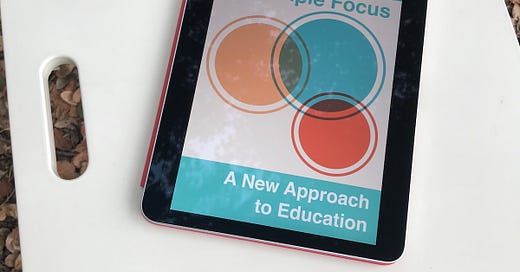This is a uniquely challenging time to write for the public forum. I appreciate the people who are attempting to bring to the foreground compassion and caring during a profoundly troubling and dangerous moment—troubling and dangerous on many levels, but especially given the current scale of conflict and loss of life. I appreciate the people considering and proposing solutions. And I definitely appreciate people bringing forward “bigger picture” perspectives.
For The Reading Table—October edition, I found myself thinking about one book in particular, a book that underpins a lot of my own work—The Triple Focus: A New Approach to Education, by Daniel Goleman and Peter Senge. I pulled it out on my iPad to revisit.
Senge and Goleman offer a Big Picture framework, especially focused on education, in The Triple Focus. Peter Senge is known for his lifelong dedication to systems thinking, captured in one of his earlier books, The Fifth Discipline. Journalist and science writer Daniel Goleman helped make emotional intelligence a household word with his 1995 book, Emotional Intelligence.
The three focuses that Senge and Goleman emphasize are: focusing on ourselves, tuning in to other people, and understanding the world: systems and systems thinking, or as they put it more simply, inner, other, and outer.
They write in the introduction:
We will describe three crucial skill sets for navigating a fast-paced world of increasing distraction and endangered person-to-person engagement— a world where the interconnections between people, objects, and the planet matter more than ever. Think of these skill sets as a triple-focus—inner, other, and outer.
Goleman describes the first two skill sets:
INNER FOCUS: focusing on ourselves—on our interior world, connecting with our sense of purpose and deepest aspirations, understanding why we feel the way we do and what to do about those feelings. Inner focus holds a key to a purposeful life, to concentrating on the task at hand, ignoring distractions, and managing our disturbing emotions.
OTHER FOCUS: tuning in to other people, or empathizing, being able to understand another person’s reality and relating to him [them] from his [their] perspective, not just from our own. Such empathy leads to caring and to the ability to work together—keys to effective, connected relationships.
Senge describes the third kind of focus:
OUTER FOCUS: understanding the larger world, the way systems interact and create webs of interdependence, whether this interaction is in a family or an organization, or the world at large. This understanding requires systems thinking, not just the simplistic “A causes B,” there-is-a-right-answer thinking of traditional education.
Senge and Goleman shine a light on the relational domain—our relationships with ourselves, each other, and the world. And all three remind us that fluency with systems is essential to understanding the problems we have and designing ethical solutions. For example, check out these first graders in Tucson, Arizona applying what they’re learning about systems thinking and reinforcing feedback loops.
Go Deeper?
Systems Thinking in a Digital World - This video is a talk by Peter Senge given at the Heart-Mind 2015 education conference—the conference title was “Human Connection in a Digital World.” It’s a wide-ranging, beautiful and thought-provoking talk.
Systems thinking or systems understanding, or particularly, systems education…it really is about interdependence, how we embrace the extraordinary level of interconnectedness or interdependence that exists amongst the living.
—Peter Senge, Systems Thinking in a Digital World (at 18:18 min)
Thank you for reading The Interconnect. And if you enjoyed reading it, please forward it to someone else who would appreciate it, and encourage them to subscribe.
Take care. Be well.




